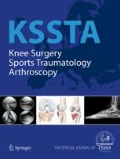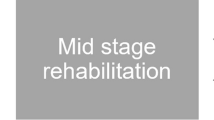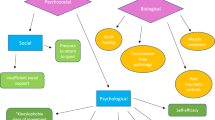Abstract
Purpose
The aim of this study is to obtain a translation and adaptation of the anterior cruciate ligament-return to sport after injury (ACL-RSI) into simplified Chinese and validate the simplified Chinese version.
Methods
Translation and adaptation were performed according to the guidelines of the American Academy of Orthopaedic Surgeons Outcome Committee. A total of 122 patients who were diagnosed with an ACL injury and underwent primary arthroscopic anterior cruciate ligament reconstruction (ACLR) between 2015 and 2016 were included in this study. The simplified Chinese version of the ACL-RSI (SC-ACL-RSI), Knee injury and Osteoarthritis Outcome Score (KOOS), Lysholm score and International Knee Documentation Committee (IKDC) subjective knee form were completed. Psychometric evaluations included score distribution, internal consistency, test–retest reliability, and construct and discriminant validity.
Results
SC-ACL-RSI scores exhibited a normal distribution without ceiling and floor effects. Internal consistency was high (Cronbach’s alpha = 0.94). The intraclass correlation coefficient was 0.98, indicating excellent test–retest reliability. SC-ACL-RSI scores were correlated with all KOOS subscales (r = 0.30 to 0.69, p < 0.001), the IKDC subjective knee form (r = 0.46, p < 0.001) and the Lysholm score (r = 0.56, p < 0.001). The mean scores between patients who returned to the same preinjury level of sport (65.1 ± 14.3) and those who could not return to the same level (51.0 ± 15.0) were significantly different (p < 0.001).
Conclusions
The SC-ACL-RSI is a reliable and valid instrument to evaluate the psychological impact of a patient returning to sport after ACLR. It is important to evaluate patients’ ability to return to sport after an ACL injury. The information provided by the SC-ACL-RSI will affect decisions regarding treatment and rehabilitation plans, which are more likely to influence clinical outcomes.
Level of evidence
II.

Similar content being viewed by others
References
Ardern CL, Taylor NF, Feller JA, Webster KE (2014) Fifty-five percent return to competitive sport following anterior cruciate ligament reconstruction surgery: an updated systematic review and meta-analysis including aspects of physical functioning and contextual factors. Br J Sports Med 48:1543–1552
Ardern CL, Taylor NF, Feller JA, Webster KE (2012) Return-to-sport outcomes at 2–7 years after anterior cruciate ligament reconstruction surgery. Am J Sports Med 40:41–48
Ardern CL, Taylor NF, Feller JA, Whitehead TS, Webster KE (2013) Psychological responses matter in returning to preinjury level of sport after anterior cruciate ligament reconstruction surgery. Am J Sports Med 41:1549–1558
Ardern CL, Webster KE, Taylor NF, Feller JA (2011) Return to sport following anterior cruciate ligament reconstruction surgery: a systematic review and meta-analysis of the state of play. Br J Sports Med 45:596–606
Beaton DE, Bombardier C, Guillemin F, Ferraz MB (2000) Guidelines for the process of cross-cultural adaptation of self-report measures. Spine 25:3186–3191
Bland JM, Altman DG (1986) Statistical methods for assessing agreement between two methods of clinical measurement. Lancet 1:307–310
Bohu Y, Klouche S, Lefevre N, Webster K, Herman S (2015) Translation, cross-cultural adaptation and validation of the French version of the anterior cruciate ligament-return to sport after injury (ACL-RSI) scale. Knee Surg Sports Traumatol Arthrosc 23:1192–1196
Cheung RT, Ngai SP, Ho KK (2016) Chinese adaptation and validation of the Knee Injury and Osteoarthritis Outcome Score (KOOS) in patients with knee osteoarthritis. Rheumatol Int 36:1449–1454
Christino MA, Fleming BC, Machan JT, Shalvoy RM (2016) Psychological factors associated with anterior cruciate ligament reconstruction recovery. Orthop J Sports Med 4:2325967116638341
Everhart JS, Best TM, Flanigan DC (2015) Psychological predictors of anterior cruciate ligament reconstruction outcomes: a systematic review. Knee Surg Sports Traumatol Arthrosc 23:752–762
Fu SN, Chan YH (2011) Translation and validation of Chinese version of international knee documentation committee subjective knee form. Disabil Rehabil 33:1186–1189
Gornitzky AL, Lott A, Yellin JL, Fabricant PD, Lawrence JT, Ganley TJ (2016) Sport-specific yearly risk and incidence of anterior cruciate ligament tears in high school athletes: a systematic review and meta-analysis. Am J Sports Med 44:2716–2723
Harput G, Tok D, Ulusoy B, Eraslan L, Yildiz TI, Turgut E et al (2017) Translation and cross-cultural adaptation of the anterior cruciate ligament-return to sport after injury (ACL-RSI) scale into Turkish. Knee Surg Sports Traumatol Arthrosc 25:159–164
Irrgang JJ, Anderson AF, Boland AL, Harner CD, Kurosaka M, Neyret P et al (2001) Development and validation of the international knee documentation committee subjective knee form. Am J Sports Med 29:600–613
Jia ZY, Wang W, Nian XW, Zhang XX, Huang ZP, Cui J et al (2016) Cross-cultural adaptation and validation of the simplified Chinese version of the knee outcome survey activities of daily living scale. Arthroscopy 32:2009–2016
Kaeding CC, Leger-St-Jean B, Magnussen RA (2017) Epidemiology and diagnosis of anterior cruciate ligament injuries. Clin Sports Med 36:1–8
Kvist J, Osterberg A, Gauffin H, Tagesson S, Webster K, Ardern C (2013) Translation and measurement properties of the Swedish version of ACL-Return to Sports after Injury questionnaire. Scand J Med Sci Sports 23:568–575
Langford JL, Webster KE, Feller JA (2009) A prospective longitudinal study to assess psychological changes following anterior cruciate ligament reconstruction surgery. Br J Sports Med 43:377–381
Mall NA, Chalmers PN, Moric M, Tanaka MJ, Cole BJ, Bach BR Jr et al (2014) Incidence and trends of anterior cruciate ligament reconstruction in the United States. Am J Sports Med 42:2363–2370
Marx RG, Menezes A, Horovitz L, Jones EC, Warren RF (2003) A comparison of two time intervals for test–retest reliability of health status instruments. J Clin Epidemiol 56:730–735
Mascarenhas R, MacDonald PB (2008) Anterior cruciate ligament reconstruction: a look at prosthetics—past, present and possible future. Mcgill J Med 11:29–37
Nyland J, Mattocks A, Kibbe S, Kalloub A, Greene JW, Caborn DN (2016) Anterior cruciate ligament reconstruction, rehabilitation, and return to play: 2015 update. Open Access J Sports Med 7:21–32
Roos EM, Roos HP, Ekdahl C, Lohmander LS (1998) Knee injury and Osteoarthritis Outcome Score (KOOS)—validation of a Swedish version. Scand J Med Sci Sports 8:439–448
Slagers AJ, Reininga IH, van den Akker-Scheek I (2017) The Dutch language anterior cruciate ligament return to sport after injury scale (ACL-RSI)—validity and reliability. J Sports Sci 35:393–401
Smith GT, McCarthy DM, Anderson KG (2000) On the sins of short-form development. Psychol Assess 12:102–111
Sonesson S, Kvist J, Ardern C, Osterberg A, Silbernagel KG (2017) Psychological factors are important to return to pre-injury sport activity after anterior cruciate ligament reconstruction: expect and motivate to satisfy. Knee Surg Sports Traumatol Arthrosc 25:1375–1384
Tegner Y, Lysholm J (1985) Rating systems in the evaluation of knee ligament injuries. Clin Orthop Relat Res: 43–49
Terwee CB, Bot SD, de Boer MR, van der Windt DA, Knol DL, Dekker J et al (2007) Quality criteria were proposed for measurement properties of health status questionnaires. J Clin Epidemiol 60:34–42
Wang W, Liu L, Chang X, Jia ZY, Zhao JZ, Xu WD (2016) Cross-cultural translation of the Lysholm knee score in Chinese and its validation in patients with anterior cruciate ligament injury. BMC Musculoskelet Disord 17:436
Webster KE, Feller JA, Lambros C (2008) Development and preliminary validation of a scale to measure the psychological impact of returning to sport following anterior cruciate ligament reconstruction surgery. Phys Ther Sport 9:9–15
Funding
This article was funded by Scholar Fund of Second Military Medical University (2016JS24), Tengfei Project (16T016), and Zonghe Project (16Z022).
Author information
Authors and Affiliations
Corresponding authors
Ethics declarations
Conflict of interest
All authors declare that they have no conflict of interest.
Ethical approval
Ethical approval was obtained from clinical research ethics committee of Changhai hospital (No. CHEC2015-041).
Informed consent
Informed consent was obtained from all individual participants included in this study.
Rights and permissions
About this article
Cite this article
Jia, Zy., Cui, J., Wang, W. et al. Translation and validation of the simplified Chinese version of the anterior cruciate ligament-return to sport after injury (ACL-RSI). Knee Surg Sports Traumatol Arthrosc 26, 2997–3003 (2018). https://doi.org/10.1007/s00167-018-4850-5
Received:
Accepted:
Published:
Issue Date:
DOI: https://doi.org/10.1007/s00167-018-4850-5




